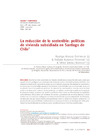Identificador persistente para citar o vincular este elemento:
https://accedacris.ulpgc.es/jspui/handle/10553/114457
| Campo DC | Valor | idioma |
|---|---|---|
| dc.contributor.author | Hidalgo Dattwyler, Rodrigo | en_US |
| dc.contributor.author | Alvarado Peterson, Voltaire | en_US |
| dc.contributor.author | Jiménez Barrado, Victor | en_US |
| dc.date.accessioned | 2022-04-27T15:58:41Z | - |
| dc.date.available | 2022-04-27T15:58:41Z | - |
| dc.date.issued | 2018 | en_US |
| dc.identifier.issn | 1133-4762 | en_US |
| dc.identifier.uri | https://accedacris.ulpgc.es/handle/10553/114457 | - |
| dc.description.abstract | Uno de los roles esenciales del Estado neoliberal es la gestión del suelo, dado que a partir de ello configura sus estrategias de bienestar social e inversión privada. En Chile, este modelo de producción espacial se apoya en una robusta estructura de asignación subsidiaria, la misma que ha pretendido ajustarse a la idea de sostenibilidad que ha colonizado tanto a la academia como a las políticas públicas. Lo anterior ha tensionado la relación entre la línea verde en el desarrollo urbano y la demanda por un hábitat residencial basado en la equidad. El presente trabajo propone una revisión y análisis crítico sobre las dimensiones de equidad y sostenibilidad (mesurables en términos de acceso y presencia de servicios básicos y áreas verdes) con las cuales se configuran los instrumentos fiscales para la adquisición de viviendas. Se descubre así que la pretendida compatibilidad entre un desarrollo urbano sostenible y la prestación de nuevos hábitats residenciales en el marco territorial de Santiago de Chile, principal metrópolis del país se presenta como una disyuntiva en términos ambientales. | en_US |
| dc.description.abstract | One of the essential roles on the neoliberal State is land management, because from it, the State can configure the strategies of social welfare and private investment. In Chile, this model of spatial production is based on a robust structure of subsidiary assignation: the same that has tried to be adjusted to the idea of sustainability, which has colonized both academia and public policies. So, this has stressed the relationship between the green line in urban development and the demand for a residential habitat based on equity. The present work proposes a critical review and analysis on the dimensions of equity and sustainability (measurable in terms of access and presence of basic services and green areas) which configure the fiscal instruments for the acquisition of housing. This analysis reveals that the alleged compatibility between a sustainable urban development model and the provision of new residential habitats within the territorial framework of Santiago de Chile-the main metropolis of the country- appears as disjunctive in environmental terms. | en_US |
| dc.language | spa | en_US |
| dc.relation | FONDECYT regular de investigación N° 1150360 | en_US |
| dc.relation.ispartof | Ciudad y Territorio: Estudios Territoriales | en_US |
| dc.source | Ciudad y Territorio: Estudios Territoriales [ISSN 2659-3254], v. 50 (196), p. 293-306 | en_US |
| dc.subject | 332904 Uso del suelo | en_US |
| dc.subject.other | Neoliberalismo | en_US |
| dc.subject.other | Políticas de sostenibilidad | en_US |
| dc.subject.other | Principios de equidad | en_US |
| dc.subject.other | Subsidios habitacionales | en_US |
| dc.subject.other | Neoliberalism | en_US |
| dc.subject.other | Sustainability policies | en_US |
| dc.subject.other | Principles of equity | en_US |
| dc.subject.other | Housing subsidies | en_US |
| dc.title | La reducción de lo sostenible: políticas de vivienda subsidiada en Santiago de Chile | en_US |
| dc.title.alternative | The reduction of sustainability: subsidized housing policies in Santiago de Chile | en_US |
| dc.type | info:eu-repo/semantics/article | en_US |
| dc.type | Article | en_US |
| dc.description.lastpage | 306 | en_US |
| dc.description.firstpage | 293 | en_US |
| dc.investigacion | Artes y Humanidades | en_US |
| dc.type2 | Artículo | en_US |
| dc.description.numberofpages | 14 | en_US |
| dc.utils.revision | Sí | en_US |
| dc.identifier.ulpgc | No | en_US |
| dc.contributor.buulpgc | BU-HUM | en_US |
| dc.description.sjr | 0,109 | |
| dc.description.sjrq | Q4 | |
| dc.description.sellofecyt | Sello FECYT | |
| dc.description.esci | ESCI | |
| dc.description.fecytq | Q2 | |
| dc.description.fecytpuntuacion | 36,57 | |
| dc.description.dialnetimpact | 0,0 | |
| dc.description.dialnetq | Q2 | |
| dc.description.dialnetd | D5 | |
| dc.description.erihplus | ERIH PLUS | |
| dc.description.avery | AVERY | |
| item.fulltext | Con texto completo | - |
| item.grantfulltext | open | - |
| crisitem.author.dept | GIR IATEXT: Sociedades y Espacios Atlánticos | - |
| crisitem.author.dept | IU de Análisis y Aplicaciones Textuales | - |
| crisitem.author.dept | Departamento de Geografía | - |
| crisitem.author.orcid | 0000-0001-7064-7465 | - |
| crisitem.author.parentorg | IU de Análisis y Aplicaciones Textuales | - |
| crisitem.author.fullName | Jiménez Barrado, Victor | - |
| Colección: | Artículos | |
Visitas 10
80
actualizado el 10-ene-2026
Descargas
1
actualizado el 10-ene-2026
Google ScholarTM
Verifica
Comparte
Exporta metadatos
Los elementos en ULPGC accedaCRIS están protegidos por derechos de autor con todos los derechos reservados, a menos que se indique lo contrario.
